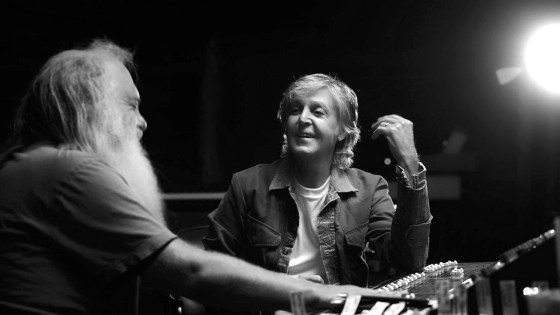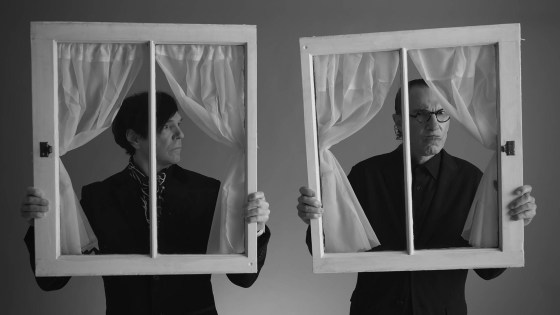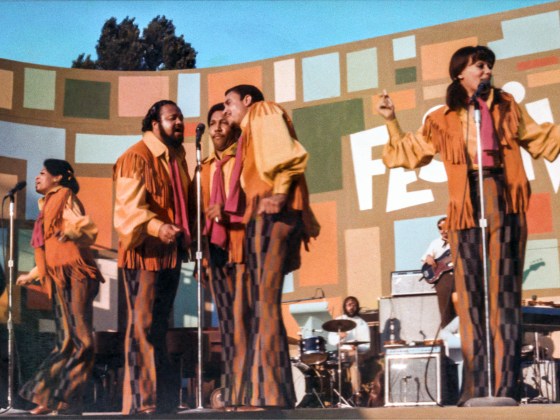In its 18th season, Top Chef suddenly became one of the most talked-about shows on TV. It’s not that people had stopped watching the Bravo reality competition, which has been airing for more than 15 years and spawned many spinoffs. But the series had long since become a known quantity. The consistency of the format, the core trio of judges (which has remained the same since Padma Lakshmi joined Tom Colicchio and Gail Simmons for Season 2) and even the goofy product placement made for reliable comfort viewing. And that was part of the appeal.
[time-brightcove not-tgx=”true”]
Then the pandemic happened. The restaurant industry was devastated. As dining rooms sat empty, some kitchens closed. Elsewhere, cooks, delivery drivers and the servers who staffed makeshift outdoor dining setups became essential workers. Meanwhile, TV crews reeling from sudden production shutdowns had to reimagine their shows to meet COVID protocols and ensure participants’ safety. For Top Chef, that meant many challenges that took advantage of outdoor kitchens, a bubble of all-star alums replacing the usual rotating cast of guest judges and a brand-new approach to viewers’ beloved Restaurant Wars. These changes, combined with a sense of pandemic-era solidarity among restaurant workers and a remarkably diverse cast in which women and people of color were in the majority, made for the most fascinating season in years. People can’t stop talking about it—and that very much includes fans at TIME. Now that the finale has aired, here’s what our writers have to say about the winner, who else we loved and what we made of a season whose inclusion, ingenuity and heart was unprecedented.—Judy Berman
Read More: Cooking in Quarantine With Top Chef Host Padma Lakshmi Means Tasting Many Nations
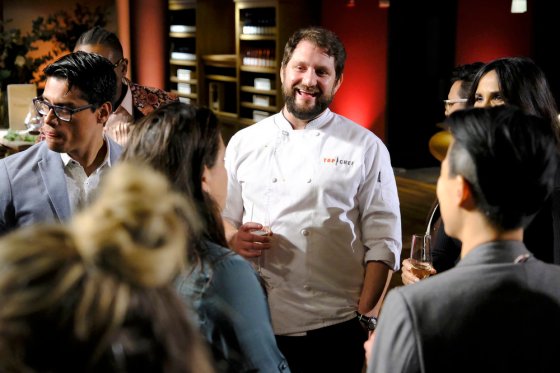
Did the right person win?
Eliana Dockterman: Technically, yes. This was one of the clearest finale wins in recent memory. The judges raved about Gabe Erales’ sauces. Dawn Burrell missed her plates—yet again—and Shota Nakajima played things a little too safe. (The editors including Shota’s comment that his goal was to just get everything on the plate seemed to subtly imply he wasn’t pushing himself, accurate or not). As a pescatarian cook, I’m still chafing over that comment that his vegetable-forward octopus course “felt like a side dish.”
From a TV production perspective: absolutely not. Gabe was fired from his last job in late 2020 over “repeated violations of policies.” Shortly after the finale aired, Padma tweeted about the need to investigate the allegations.
One of the all-star judges Gregory Gourdet posted on his own Instagram, “The restaurant industry has a long way to go, and I wonder if we’ll ever get there. First step—let’s stop industry worker abuse.” This season seemed dedicated to proving kitchens don’t have to be toxic workplaces. Gabe’s win complicates that narrative.
I was also far more invested in Shota and Dawn. Frankly, Gabe should have gone home last week when the judges couldn’t bring themselves to eliminate anyone. If I were Shota, who won the penultimate challenge and yet still had to compete against two other cooks in the finale, I’d be pretty annoyed right now.
Kat Moon: I, too, was far more invested in Shota and Dawn—and particularly rooted for Shota after seeing his creativity and consistency in the last handful of challenges. So in short, this was a huge letdown. Addressing the issue is a step in the right direction, but Gabe’s win certainly casts a shadow on this season.
Eliana is right in that technically, he outcooked the other two chefs in the finale. But that’s a hard pill to swallow when Shota has, across the board, put up many of the most successful and stunning dishes this season. I also did not think he played things a little too safe in this final cook: he made curry with beef tongue! That is not a protein you typically see with the classic Japanese dish, and at least on the screen, the meat looked unbelievably tender.
Though the ending was not what I had hoped for, I can easily say that one of my favorite moments in the finale was when chef Edward Lee said that Shota’s curry made him emotional (to see something that kids made fun of him at school for eating now as a dish on Top Chef is “a very special moment,” Edward said). That is the type of from-the-heart response that I’d love to continue to see on Top Chef, and something I truly believe is only possible if the panel of judges and diners remains diverse like it was this season.
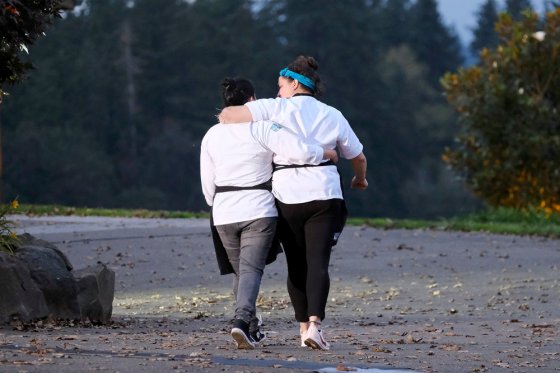
Do you like “nice” Top Chef (supportive, friendly environment as seen in this season) better than “mean” Top Chef (drama-heavy, lots of yelling as seen in most past seasons)?
Judy Berman: I do prefer “nice” Top Chef—or, at least, I’m pretty sure I prefer this season to any other past season, and not just because it was such a hard year for the restaurant industry. I’ve been watching the show, on and off, since it premiered, so it’s not like I didn’t find the early casts compelling. It was fun to have heroes and villains. I went into those finales with stronger opinions.
But what’s become clear about not just Top Chef, but also Project Runway, The Great British Baking Show and Netflix’s unlikely glass-blowing hit Blown Away, is that the talent and creativity contestants bring to the competitions is what makes them worth returning to. You could turn on Bravo at any hour of any day and see reality TV stars calling each other names. It’s more rare that you get the chance to watch skillful artists and artisans work. That’s especially true in the case of Top Chef, which consistently attracts such impressive contestants. Also, maybe this is geeky, but I love listening in on earnest discussions of craft among people who respect each other as much as they care about their art form.
ED: My favorite Top Chef season ever is Top Chef Chicago, and not just because I’m from Chicago. It was dramatic as hell, and that was fun. Dale Talde punched a locker! Spike Mendhelson and Antonia Lofaso screamed at each other about butternut squash soup! Richard Blais imploded in the finale! One dude tried to feed a bunch of Bears fans a vegetarian meal at a tailgate, and they got mad at him! Which, lol.
And yet I like “nice” Top Chef better. Ultimately it was quiet, kind Stephanie who won the Chicago season and has become one of the most celebrated alumni of the show. (Check out Girl and the Goat if you’re ever in the Windy City.) Top Chef has figured out, over the years, it’s a cooking show, not a reality show. Plus, hopefully nice Top Chef means we won’t get outright misogynist contestants like Mike Isabella ever again. Good riddance.
KM: Yes, no more Mike Isabella please. Like Judy said, there are plenty of reality series with cast members screaming at each other, and that is not what I watch Top Chef for. My vote is 100% for the “nice” version of the show, in large part because I’m a sucker for sappy television. (My favorite cooking series is MasterChef Australia, where eliminations often end in tearful goodbyes.) Still, it’s the cooking chops and not the friendships that draw me to Top Chef. While moments like contestants helping each other plate dishes against the timer warmed my heart, what I’ve enjoyed most this season is watching established chefs adapt to challenges with skill and originality.

How was this season a step forward in diversity and inclusion?
KM: One of my favorite parts of last season, Top Chef: All-Stars L.A., was watching chefs like Melissa and Gregory incorporate flavors and techniques from their cultural backgrounds (I still think of Melissa’s Hong Kong milk tea tiramisu often). We saw even more of that this year, with contestants fully embracing familiar cuisines. This is worlds apart from incidents like 10 years ago, when Heather Terhune told Beverly Kim in Top Chef: Texas that she did not want their dish to be “too Asian.” “I’m not going home,” Turhune had added, as if to suggest that Asian cooking leads to elimination.
Now, besides the chefs highlighting foods connected to their ethnicities themselves, the show builds episodes around a variety of cuisines, from Pan African to Indigenous. The best part of these segments have been how they center those from the communities being spotlighted—in the challenge set at Cascade Locks, for instance, the contestants first received mini-lessons from members of the Confederated Tribes of the Umatilla Indian Reservation before cooking for these local leaders. After terrible missteps like the 2016 Top Chef: Charleston episode hosted at Boone Hall Plantation, the intentionality and thoughtfulness behind most challenges of this season are much needed.
ED: For dozens of seasons on Top Chef, BIPOC chefs have been warned against being pigeonholed by “always cooking Mexican food” or “always cooking Chinese food,” etc. The show has thankfully shifted to asking chefs to just “cook their food.” Thank God.
But let’s unpack what “cook your food” means, because I think it’s complicated. I felt deeply uncomfortable when Brittany said she planned to draw from her German background for the West African challenge. That was never going to end well. This woman does not have the context to honor the cuisine she was being asked to cook, and ultimately the judges called her food “too white.” Which, of course! She was obviously not the strongest contestant and couldn’t adapt whereas other white chefs did. But at what point is asking a white chef to cook a version of a cuisine that’s not part of their culinary toolbox appropriation?
And what happens when a white chef’s perspective is problematic? In Restaurant Wars last season, Kevin, a white Southerner, conceptualized a “plantation” themed restaurant. A plantation themed restaurant? In 2020?! (He later apologized.)
On the flip side, Chris got knocked this season for failing to pull off dishes inspired by the African diaspora while being told to cook “his food.” Again, the assumption that Chris, who said he hadn’t cooked West African food in many years, would have a specific perspective on those dishes, felt unfair. Then came the criticisms of Byron for getting too wrapped up in his Eleven Madison Park past and not cooking “his food,” presumed, I guess, to be less elevated? The show seems to believe a chef’s vision is directly connected with their cultural background, which can be empowering in some circumstances and perhaps stereotyping in other contexts.
KM: You touch on a ton of great points regarding the emphasis on “cooking your food.” While I absolutely love seeing BIPOC contestants feeling emboldened to cook with ingredients they grew up with and methods they’re specialized in, the show needs to dive deeper into what it means when judges make this request. In one episode this season, Richard Blais commented on Jamie’s thịt kho braised brisket dish by saying, “It doesn’t scream any sort of one point of view.” What does he mean by a “point of view”?
I recently rewatched Top Chef: Seattle, where Kristen Kish, who is Korean-born and raised by a white adoptive family in the U.S., won the season mostly by cooking dishes inspired by classical French cuisine. During restaurant wars in which she led one team, her teammate asked if she was planning to add any Korean influence into the menu. Kristen said not really, and I think that’s completely fine. Her approach doesn’t make her any less deserving of a winner compared to other contestants who take influences from other cuisines. Eliana brought up the criticism toward Chris, and in some ways Kristen reminds me of him as they are both classically trained in French cuisine. I wonder if the judges’ reception of her food would be different today with this increased focus on cooking with a “point of view.” Also, it seems quite unfair if, on his seasons, a white chef like Richard can get away with his point of view being molecular gastronomy.

Many adjustments were made this season due to COVID. What are pandemic-related changes or challenges that we want to keep or drop?
ED: I know the group of all-star judges was controversial, but I hope some of them return next season (assuming their restaurants can run smoothly without them). It was great to see my favorites again, especially Melissa, Gregory, Kwame, Kristen and Brooke, all of whom can hold their ground against the heavyweight celebrity chefs the show usually brings on.
I also think the fact that the judges remained the same throughout the season and tasted the same contestants’ food again and again emboldened them to occasionally disagree with Tom, Padma and Gail. Especially in the final rounds, every contestant is cooking at the highest levels, and it often comes down to subjective judgment. I enjoyed those debates. They felt more honest than past seasons where whatever Tom says goes.
Which is not to say I don’t love Tom. Oh, how I love Tom. The man was screaming for ice cream sandwiches out the window of a car at a drive-in, which is some big COVID energy. My one objection to the All-Star panel is that the show seems to want to set up Richard Blais as the next Tom Colicchio. Producers, please don’t do that. I find Richard canned and insufferable. Nobody can replace Tom—or his absolutely insane collection of hats.
Elijah Wolfson: Regarding the consistency of the judges—I felt almost completely opposite! While it’s true that in the past the guest judges changed every episode, and therefore didn’t have the context of having experienced the contestants’ development along the way, they also didn’t ever really have much to say, ultimately; the decision was always in the hands of the official panel of judges. I felt that the way it played out this season made for a lot of weirdness. It seemed to me that the rules of engagement would change episode to episode based on which members of the rotating cast of judges were involved, especially given Tom, Padma and Gail’s atypical deference this season. I reserve the right to amend this depending on how things play out, but I don’t think Dawn is still here in any other season. I’m not fully mad at it, because she does seem to be able to cook delicious things, but I also feel like because of a few especially vocal judges, she’s been given a lot of passes along the way.
Also, are we sure Tom is okay? Some of those hats seemed like a cry for help.
JB: In theory, I liked the panel of judges. Eliana’s favorites are also my favorites, though I’m also a big fan of Dale, whose defunct restaurant in my neighborhood I miss and whose increasing frustration with Dawn’s inability to get all of her components on each of the plates made for a pretty great, if subtle, running gag. And I, too, am puzzled as to why Richard seems to be the Chosen One among them. I’m sure his food is great, but that doesn’t make a good TV host.
Anyway, I do think there would need to be some changes made if the show were to stick with the panel approach. If we’re going to see the same judges week after week, there’s no reason for them not to take a contestant’s performance in earlier challenges into consideration when deciding who to eliminate. That would prevent someone like Sara, who was such a superstar in almost every previous episode, from getting knocked out based on one weak dish. It also muddles the relationships a bit when you have the same All Stars judging one week, mentoring the next and even sometimes forming teams with contestants. Situations where certain judges become advocates for certain chefs seem inevitable.
One last, unrelated thing: I know Top Chef needs that sponsorship money from national mega-brands, and so it must give us some boring challenges that double as ads (did anyone really need to see this group of chefs cook with Campbell’s soup?). But I really enjoyed the effort it made this season to also support smaller, local food businesses, from Ota Tofu to Astoria Co-op.
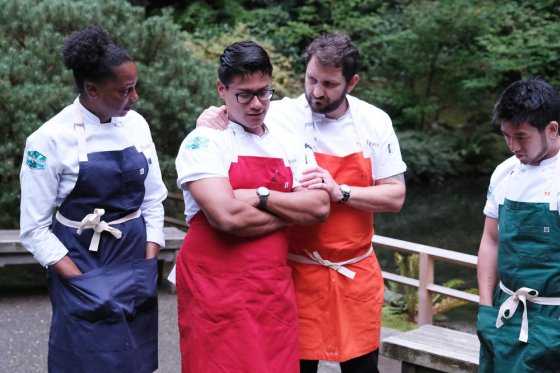
Thoughts on the role of Last Chance Kitchen this season? Too big or too small?
EW: If the ends justify the means, this was an extremely successful Last Chance Kitchen. It might have just been the overall skill level of the participants, or maybe it was the tweaks to the format—but either way, I don’t think I’ve ever seen such consistently positive responses to LCK dishes.
That said, the two-part finale made the whole thing feel like a cruel, sisyphean task. Sara and Byron both do not cook Japanese food or anything really close to it in terms of flavor profiles, and both made great dishes in the “Bento Box” challenge in the penultimate episode. Both also proved themselves as great chefs throughout the season. The winner of this challenge did not get to return to the main competition.
Instead, after beating Sara in the Bento challenge, Byron then had to take on three of the remaining contestants so he could…compete against the remaining contestants? And the challenge was to make a dish better than the dish made by the chefs who chose the ingredients for said dishes? It made no sense narratively or structurally, and was basically impossible; it’s hard to imagine any chef succeeding in this context. Frankly it’s a testament to Byron’s ability that he won even one of the three competitions in the LCK finale—I was exhausted just watching it all play out. I wish the show had made a clearer choice between creating a realistic pathway for a second eliminated contestant to return to the main event, or not.
Also, again—are we sure Tom is okay? The “Start Your Engines” episode of LCK was extremely weird. I get that they need to give the financial sponsors some screen time, but this seemed extreme. It’s hard to imagine Tom agreeing to this gimmick in any other year. Did he buy that leather racer jacket for this, or was that in the back of his closet just waiting for this moment this whole time? Has he had a secret urge to drive fast rather than cook fast all these years? Do you think he can even change a tire?
JB: Poor Tom! I find him so endearing. I love to hear him talk about food; unlike so many celebrity chefs, he’s convinced me that he’d be obsessing over this stuff even if he didn’t get paid piles of money to pontificate about it on TV. Which, I think, is why it hurts to watch him drive around a race track until he’s dizzy in order to work a car-company sponsor into a food show.
I agree about that miserable bait-and-switch LCK finale. And in general, although I do like the parallel competition, I just think it played too big a role this season. The show kept shifting people from the Top Chef A-team to the LCK B-team, to the extent that you really had to watch the latter to understand what was happening on the main show. I get why that would be desirable for Bravo, but in my opinion Top Chef should work as a standalone series.
ED: Hard agree with all the above. Last season, Kevin had to win two out of three cooks to re-enter the competition. But unlike Byron, he hadn’t just competed in a tournament-style elimination challenge that required several more cooks on top of that.
Also, #JusticeForSara! She has gotten a lot of hate online for being giggly and humble at first and turning competitive in Last Chance Kitchen. I find that criticism to be pretty sexist—as women, we’re taught to downplay our talents to make everyone else comfortable. Sara seems like a lovely person. And she was a frontrunner for a bit, so it’s safe to assume she has a competitive streak, and that’s great.
Also did anyone else clock that Shota said he was rooting for Sara? He looked so bummed when she lost. I am among the many TC fans hardcore shipping them #teamtinyfish.
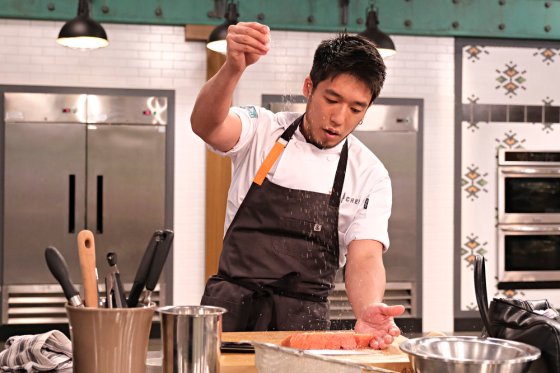
Who is your vote for fan-favorite?
ED: Shota is not only my fan favorite for the season but among my favorite contestants ever. I still can’t believe that he won the cheddar cheese challenge cooking a traditional Japanese meal. That took guts and imagination!
But Shota really won me over during Restaurant Wars. For so many seasons, the loudest, most domineering chefs always seemed to run the kitchen with an iron fist during Restaurant Wars. We can attribute much of that to casting choices made back when the show was a bit more concerned with drama than the integrity of its cooks. But moments of chef-splaining, yelling, and punched lockers in the Stew Room also reflected longstanding, toxic tropes of the food world where Hell’s Kitchen-style aggression, especially from entitled white dudes, was rewarded.
Shota’s Restaurant Wars performance felt like a radical repudiation of that problematic behavior. He came up with a brilliant concept (kaiseki was a perfect idea for the open kitchen challenge) and asked his team members to play to their own strengths. He quietly, kindly, but firmly kept the chefs on time, the diners happy, the momentum going. Together, the team presented what some of the judges said was the best meal in Restaurant Wars ever. Shota didn’t win the individual prize, but it didn’t matter. He showed that chefs can flourish under a more generous type of leadership. He’s the future of the food world.
EW: Shota, hands down. I love this man, and I can’t wait to eat his food some day. I didn’t realize there was a contingent of fans shipping Shota and Sara but now that I do, I want to join. When they got paired together for the surf & turf elimination challenge earlier in the season, I texted “Shota+Sara dream team” to everyone I knew who was watching the show, and some who weren’t. Eliana already eloquently described just how inspirational Shota’s contribution to Restaurant Wars was, so I won’t repeat, and will just say that I cosign everything she said.
JB: Love Shota, because of everything Elijah and Eliana already said. Was he the favorite to win for most of the season? Yes. Did he make the most consistently interesting and delicious food? Looks like it. Did he also benefit from what really felt like a winner edit? Yeah, that too. But I’m sure his ingenuity, inspiration and high expectations for himself would’ve shone through regardless.
All of that said… my fan favorite was Jamie. Obviously, her attempt to sacrifice herself so that Maria could stay was one of the kindest moments in the history of reality TV. I teared up. But I loved her pretty much the moment she beep-booped her way into the Top Chef kitchen. Just because you’re cute and silly and nurturing and self-deprecating, doesn’t mean you can’t also be a formidable talent or a strong competitor. Jamie proved that, and there’s no contestant whose career I’ll be more excited to follow in the future.
EW: Thank you Judy, for reminding me to keep in touch with my feelings. The episode in which Jamie attempted to sacrifice herself to save Maria was truly one of the best hours of TV I have ever seen; I too teared up, and my understanding of goodness in the world was recalibrated. Nevertheless, I’m sticking with my first choice. When it comes down to it, Shota is the chef I want to sous for, and drink with, and learn from the most.
KM: I, too, am fully onboard the Shota train. But on the note of Maria, she was easily one of my favorites this season. Many scenes moved me to tears across the episodes, and more often than not, I was crying with Maria. A prime example: when she said the elimination challenge of feeding frontline workers hit home because she’s married to a firefighter. Yes, I want to try her dishes, from the beef lengua sando (tongue sandwich) to the literally filled-to-the-brim “Gallina Pinta” soup. But more than that, I adored Maria because so much of her captured the spirit of this season: more empathetic, more human.
from RSSMix.com Mix ID 13001087 https://ift.tt/2Tsmrnj

